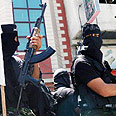
Palestinians headed to civil war
All signs show that a bloody Hamas-Fatah confrontation will come soon
The meeting that took place last week in Beit El, attended by 10 Palestinian West Bank security chiefs as well as Israeli military and police officers, attests to a shift by Mahmoud Abbas and his people. This is not yet a strategic change, and it is not yet a military alliance between Fatah and Israel vis-à-vis Hamas, but nonetheless, it’s a shift. The Fatah-led Palestinian national camp and the Hamas-led radical Islamic camp are closer than ever to a historic and violent all-out clash; a true civil war.
The statements made by senior Fatah officials during the meeting were unprecedented. Fatah officers openly called for “joint action with Israel against the common enemy – Hamas,” and expressed their “willingness to take care of the Hamas mosques and institutions using information provided by Israel.” This is certainly an interesting novelty. I wonder about the reaction of Jibril Rajoub and Mohammad Dahlan, who swore that Fatah will never become Israel’s security contractor in the territories. Maybe this is why today Dahlan is a building contractor, while Rajoub heads the Palestinian soccer association.
The first “intra-Palestinian Intifada” is expected to take place in the coming two to three months, and should climax in January 2009. Three elements are at the basis of this civil war, which is expected, for the first time, to become a bloody and uncompromising confrontation until the enemy is defeated.
Hamas wants presidential elections
The first element is Hamas’ expected challenge over the validity of Mahmoud Abbas’ presidency. The Palestinian leader’s four-year term in office will end on January 9th. While Abbas, who is ignoring the “Hamas rebels in Gaza,” is determined to continue in the post for a fifth year, Hamas leader Khaled Mashaal urged him to terminate his term in office and allow free presidential elections, in the hopes that the next president will be a Hamas man. Abbas has already announced that a challenge to his presidency would prompt him to declare Gaza a “rebellious territory” and lead to complete disengagement between the two parts of the Palestinian Authority.
The second element is Abbas’ desire to prevent a repeat of the 2007Gaza events in the West Bank. The embarrassment, as the Palestinians refer to it, that is, the embarrassing humiliation involving Dahlan and his forces in Gaza, constituted a warning that similar developments are expected in the West Bank as well. While Hamas does not have strong military bases and fighting forces in the West Bank as it does in the Gaza Strip, the ideological support enjoyed by the group in the West Bank is no weaker than in Gaza.
Those who are no less concerned than Abbas are American General Keith Dayton, who is rebuilding the PA’s defensive forces, as well as IDF and Shin Bet officers who recommend Israeli assistance to Fatah in preparation for war. Many Palestinians believe that without the IDF backing granted to Abbas in the West Bank, Hamas would have expelled Fatah a long time ago using broomsticks. Both Dayton and the IDF are concerned about the “June 2007 syndrome,” where Hamas’ ideological zeal defeated the fat and satiated Fatah, which was hated by the public, in Gaza.
We should keep in mind that in the West Bank, Fatah is still perceived as a corrupt organization padded with Western money and weapons – a fact that works against it when it comes to local public support. At the end of the day, we can expect a clash between Fatah’s military forces in the West bank and Hamas’ popular power; a Fatah victory is not at all guaranteed.
A Palestinian Altalena
The third reason for the upcoming clash is the fact that for the first time since the Oslo Accords, Abbas and his forces are truly with their backs against the wall. Abbas indeed enjoys Western support, yet he realizes that as opposed to the previous battles where Fatah was defeated, the next one will also take place at the government compound in Ramallah. He would not want to see impassioned religious masses besieging his office and calling for his head.
Fatah leaders have emergency escape plans, and most of them own homes overseas. We should not be surprised if they make use of them again this time. However, this time around it appears that that Abbas would at least order Fatah men to open fire on Hamas men; this time around, we shall see a Palestinian Altalena.
And what about the Israeli angle? This time, it’s a very sharp one. In addition to the Israeli assistance offered to Fatah, Israel also holds Hamas “hostages.” As we know, Hamas leader Khaled Mashaal seeks to dismiss Abbas “democratically,” that is, via a Palestinian High Court declaration, to be supported by two thirds of the Palestinian Legislative Council. Yet while Fatah holds only 48 out of 132 seats in the Council, as opposed to Hamas’ 76, about half of Hamas’ parliamentarians are jailed in Israel and are used as a bargaining chip ever since Gilad Shalit’s abduction.
Colonel (res.) Moshe Elad served in various posts in the territories and currently researches Palestinian society at the Shmuel Neeman Institute at the Technion. He also serves as a lecturer at the Western Galilee Academic College










